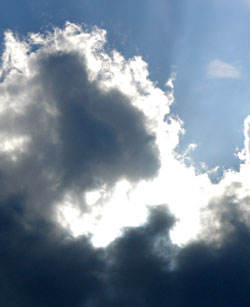 July 4, 2006 was marked by several rocket launches, one from the Kennedy space center in Florida, one from Gaza into Israel, and several from North Korea. U.S.A. Today's story reports that 7 missiles were launched from Pyongyang. Quoting from the story,
July 4, 2006 was marked by several rocket launches, one from the Kennedy space center in Florida, one from Gaza into Israel, and several from North Korea. U.S.A. Today's story reports that 7 missiles were launched from Pyongyang. Quoting from the story,North Korea test-fired a seventh missile Wednesday, intensifying the furor that began when the reclusive regime defied international protests by launching a long-range missile and at least five shorter-range rockets earlier in the day.
The missiles, all of which apparently fell harmlessly into the Sea of Japan, provoked international condemnation, the convening of an emergency meeting of the U.N. Security Council and calls in Tokyo for economic sanctions against the impoverished communist regime.
North Korea remained defiant, with one official arguing it had the right to such launches. The tests and the impenitent North Korean attitude raised fears that further firings could follow.
NASA has been plagued by tragedy, storms of controversy and lack of program support for several years. Yahoo! News has the story about the current shuttle mission, launched yesterday, characterizing NASA as "the troubled U.S. space program." To quote from today's article,
Astronauts on the shuttle Discovery awoke to their first full day in space on Wednesday and prepared to inspect their orbiter for damage after launching from Florida on a flight NASA hopes will get the troubled U.S. space program back on track.My own support has been unflagging since President Kennedy launched it in the early 1960's. As a big fan over the ensuing years, I have learned the crews' names, watched all the launches and recoveries, mourned the loss of lives, visited the Johnson Space Center in Houston, and approved of all NASA's spending of my tax dollars. The NASA website and TV channel are on my favorites lists. I also subscribe to RSS feeds that help me keep up to date on news on science and space:
Photos and videos from Tuesday's Fourth of July takeoff showed flecks of insulating foam flying off the shuttle's problem-plagued fuel tank after launch, but NASA executives said initial examinations revealed no cause for alarm.
The shuttle crew was to spend most of Wednesday using a robot arm to scan Discovery's most vulnerable parts with lasers and close-up cameras to see if the loose foam caused any nicks to the spacecraft's protective heat shield. A 1.67 pound (756 gram) chunk of fuel tank foam was blamed for the Columbia disaster in 2003 after it slammed into the huttle's wing at launch and later caused the orbiter to break apart over Texas, killing the seven astronauts on board.
Potentially dangerous foam also flew off on a subsequent shuttle mission last summer, raising questions about whether the spacecraft NASA has flown since 1981 could still be operated safely enough to finish the half-completed $100 billion
International Space Station. NASA spent $1.3 billion over the last three years to fix the fuel tank and make safety upgrades to the shuttle.
Support for launches. . . or not. As we all celebrated the Fourth of July launch of "Discovery" we were feeling relief as the shuttle achieved orbit. Other launch news was most unsettling to us and to many around the globe. USA Today headlined, "World condemns North Korea missile tests." "Infuriated" Israeli Prime Minister, Ehud Olmert, called the Palestinian launch "an escalation of unprecedented gravity."And you can bet that U.S. Ambassador John Bolton will be huffing and puffing at the U.N. in New York today. According to the New York Times,
At the United Nations, John R. Bolton, the United States ambassador, was "urgently consulting" with other members of the Security Council to try to schedule a meeting of the panel, according to his spokesman, Richard A. Grenell. Later in the evening, it was announced that the Council would meet to take up the matter at 10 a.m. Wednesday at the request of Japan.Why support NASA's rocket launches? It is a peaceful use of space, unlike the others mentioned in this post. In some ways the International Space Station is more successful than the United Nations in fostering joint endeavor among several nations. And, unlike the United Nations which is forced to arm its peacekeepers, the astronauts on the ISS have no weapons, as far as we know. And finally, it is cliche, of course, to mention the wealth of space discoveries from NASA technology that now enrich the populations of earth. See also, The SpacePlace. Check it out; peaceful launches do pay off.
Tags: NASA Discovery space economics North Korea rocket missiles
No comments:
Post a Comment